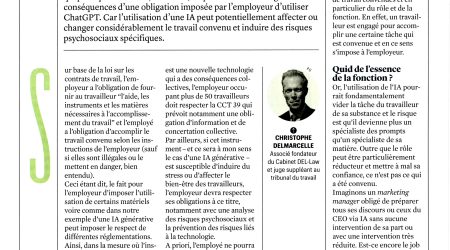Civil Servants, Under Statute or Contract (Trends, 26-12-2024)
Posted the 7 January 2025The gradual contractualization of civil servants has been a reality for over a decade at all levels of government. However, the question of the definitive abolition of the famous "statute" of civil servants justifies a societal debate and undoubtedly a reminder of certain truths about this statute and the comparison with a permanent employment contract (CDI).
As a reminder, the statute is a framework of rules unilaterally established by the state (or the concerned entity) determining all aspects of the civil servant's career: recruitment, salary developments, career advancements, in a coherent and equal manner for all civil servants.
It is essential here to recall the objective that motivated the legislator when creating the civil servant statute in 1937 (Royal Decree of October 2, 1937).
The legislator intended to (i) protect civil servants from political or economic pressures to ensure total impartiality, (ii) guarantee that essential services are maintained, even in times of crises or political changes, or (iii) allow public agents to fulfill missions of general interest with specific legal guarantees, protected from economic or social vicissitudes, and finally, (iv) ensure the unwavering loyalty of civil servants to the state and their long-term commitment.
These objectives, which are indeed specific to a state and very different from a private company, justify the fundamental differences between the statute and the CDI.
Obviously, a work contract, even for an indefinite period, is a flexible tool intended to allow companies to relatively easily get rid of their staff. In times of crisis, dismissing is easier, faster, and cheaper than selling machines or buildings. And when things improve, it is enough to rehire. However, the state does not need this flexibility, as most public services have a constant workload (same number of schoolchildren, same number of tax returns, etc.) that makes it unnecessary to easily reduce staff numbers, and the state is less subject to economic fluctuations.
Another evident fact is that the state needs more loyalty and long-term commitment than companies, especially to ensure service continuity or avoid risks of collusion or pressure. Because the civil servant commits long-term and benefits from a stable and locked statute, they will not fear resisting the instructions of a minister, will be less tempted to accept a "gift," and will not leave in the middle of a control or audit mission, resulting in its cessation.
The state especially does not need competition among its civil servants to earn the most or progress the fastest but rather collective work with the feeling of belonging to the same team (at least in theory).
These conceptual and legal differences between these two tools, the statute and the work contract, make a comparison between the two almost impossible without first understanding their purposes and the needs they fulfill.
And the purposes and needs of a state are, notably due to its sovereign power, not those of a private company, certainly for essential missions such as taxation, education, civil status, justice, police.
Sure, the statute can lead to abuses, and everyone will have a good example of such abuses and a desire to avoid them, but it retains its conceptual importance in 2025 as in 1937 because the state needs people willing to commit for life and dedicate themselves to serving others.
Moreover, this is precisely the reason for the increased pension for civil servants, to thank them for this very long-term commitment but also to keep them over time. The civil servants' pension is the employees' bonus but at the end of their mission. Work for me your whole life for a lower salary than in the private sector, and I will take care of you at your retirement by ensuring a good pension (which you will be eager not to lose by moving to the private sector)...
The two tools can certainly be combined for the benefit of all, maintaining a minimal base of civil servants under statute, certainly in essential services or at the management level, with, moreover, a reinforcement of motivated contract workers.
Related articles

Is an employer allowed to mandate the use of artificial intelligence tools by employees ? (Trends, 17-07-2025)

Caution if a former colleague opposed to your employer asks you to testify in their favor
